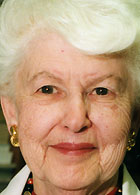Irene E. Karl, Ph.D., a pioneer in the cause and treatment of sepsis and a world-renowned authority on muscle metabolism, died Friday, July 7, 2006, at her home in Richmond Heights, Mo. She was 90.
Karl, research professor of medicine in the Division of Metabolism, dedicated more than 50 years to identifying and understanding diabetes and sepsis, or blood poisoning, which is the leading cause of death in neonatal and surgical intensive-care units.

In addition to publishing more than 150 articles in prestigious peer-reviewed publications, including the Journal of the American Medical Association and The New England Journal of Medicine, Karl earned accolades from her colleagues at the University for her scientific achievements as well as her caring personality.
“In her earlier years in Dr. David Kipnis’ lab, Irene Karl was both a rigorous technical mentor to countless postdoctoral fellows in the laboratory and a sensitive human mentor to many of those fellows outside of the laboratory,” said Philip E. Cryer, M.D., the Irene E. and Michael M. Karl Professor of Endocrinology and Metabolism in Medicine. “Throughout her career, it was clear that she cared about the welfare of young people in their professional lives and in their personal lives.”
Chancellor Emeritus and life trustee William H. Danforth, M.D., said Karl was one of the “great people” of the University. “She was admired and loved, a role model for women and for men, too,” he said.
Kenneth Polonsky, M.D., the Adolphus Busch Professor of Medicine, head of the Department of Internal Medicine and professor of cell biology and physiology, said Karl made major contributions to the understanding of diabetes as she worked with Kipnis, and more recently devoted her scientific efforts to the study of sepsis in collaboration with Richard Hotchkiss, M.D., professor of anesthesiology, of medicine, of surgery and of molecular biology and pharmacology. Their findings presented a new way to view sepsis.
“Irene was deeply committed to the School of Medicine and to the Department of Medicine and was particularly passionate about promoting the role of women in science,” Polonsky said. “We are indeed fortunate to have benefited from Irene’s outstanding personal and professional qualities and to have enjoyed working with her as a friend and colleague.”
Hotchkiss said, “Although there are numerous remarkable qualities to Irene, the one that most stands out in my mind is the manner in which she touched so many lives at Washington University.
“Irene was gracious and warm to everyone, from the parking lot attendants to the cafeteria workers, to the heads of the departments. She treated them all the same, with a genuine caring spirit. It was her innumerable acts of kindness and love to everyone that I will always remember.”
Karl was born in 1915 in Milwaukee. In 1937, she graduated summa cum laude with a degree in chemistry from the University in Wisconsin, where she was the only woman in a class of 400. Defying social and cultural expectations, she became the first woman to earn a doctorate in science from the University of Wisconsin, which she accomplished in just three years.
In 1941, Karl married her high-school sweetheart, Michael M. Karl, M.D., professor of clinical medicine, and began working as a biochemist at Jewish Hospital. She took some time off to raise two daughters, and returned to the School of Medicine in 1959 as a research assistant in preventative medicine.
In 1966, she became a research instructor for the Endocrinology, Diabetes and Metabolism Division, and in 1981 became a research professor of medicine. She also served on the Committee on Admissions for the School of Medicine.
The Karls were the first married couple at the University to be honored with a named professorship, which was set up by gifts from friends and patients.
In honor of the Karls, Alene and Meyer Koplow created the Michael and Irene Karl Lecture, which is part of the Masters in Medicine series.
In 2002, Karl was the first female scientist to receive the Jewish Federation Business & Professional Woman of Valor award. Both Karls received the Albert Einstein Award from Technion University, the Barnes Hospital Distinguished Service Award and the Second Century Award from the School of Medicine.
Karl is survived by her husband, Michael; daughters Bonnie Karl Staffier and Terry Karl; a brother, Henry Stark of Milwaukee; and three grandchildren.
Memorial contributions may be made to the Dr. Irene Karl Memorial Fund for Women in Science at Washington University, Washington University School of Medicine, 660 S. Euclid Ave., St. Louis, MO 63110.
— Beth Miller